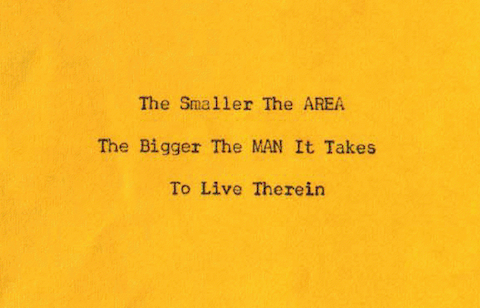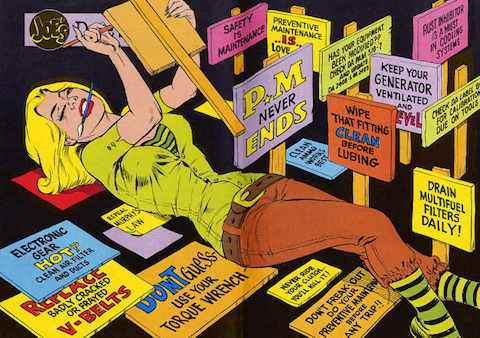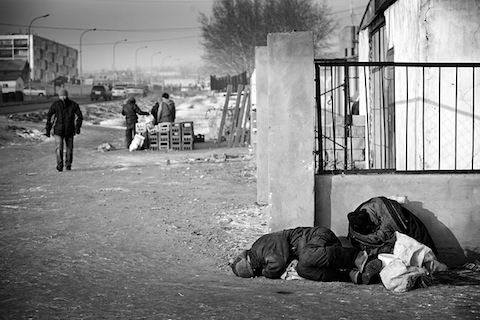Brendan I. Koerner's Blog, page 20
June 12, 2012
Voyage Into Inner Space

The above comes from the military manual given to all new arrivals at Johnston Atoll, the Pacific island where we dumped a whole bunch of toxic material back in the day. I can’t help but love the accidental Zen of this motto.
More on the Johnston Atoll lifestyle here.
June 11, 2012
Tighten Up Tighter

The Army knew better than to stick a talent like Will Eisner in a foxhole. The artist was allowed to serve his country from behind a drawing board, where he was the chief creative force behind a series of comic instructional manuals. The best-known of these was Preventive Maintenance Monthly, the highlight of which was always Eisner’s single-panel “Joe’s Dope Sheet” feature. The star of “Joe’s Dope Sheet” was the unnamed woman above, who somehow managed to make gasket-tightening seem quasi-pornographic. I’m especially fond of this installment, in which the woman castigates a pint-sized soldier for installing the wrong cable control unit on his bulldozer. Though Eisner was also capable of much more overtly titillating fare, too.
Laugh at the sophomoric use of pneumatic sexuality if you must. But think of how many lives were saved by the messages contained within Eisner’s cheesecake work. If you’re grandfather didn’t die in a jeep accident in Korea, he might well have the female star of “Joe’s Dope Sheet” to thank.
June 8, 2012
Non-Daily Operation

Tremendous apologies for failing to living up to this project’s motto this week. Much craziness with sifting through book edits and trying to rent out the former global headquarters. Was planning something special for today, but need to make an emergency trip to the heart of Nieuw Amsterdam to see a man about some papers. Thanks, as always, for your forbearance, and see you back here next week with posts about college athletics, feral pigs, and the Venezuelan steel mafia.
June 5, 2012
To Scatter an Area
I am no great authority on Igbo music, but I think it’s safe to say that Area Scatter was one of the genre’s very few transvestite thumb pianists. The gender-bending was integral to his rock-star mythology, as detailed in Beats of the Heart:
His home was filled with bones and skulls and paintings of the power of good and evil. A muscular, humorous man, he explained how, after living through the civil war, he had gone into the wilderness for seven months and seven days and had reappeared transformed into a woman. The day we visited him he headed off, dressed in white smock, polka-dot skirt and a shamanist bone necklace, to the residence of his Royal Highness Eonunnoke to play for the local king and queen.
The clip above seems to be the only surviving video of Area Scatter, but John Beadle’s post has links to several songs. It also has this explanation of the musician’s unusual moniker, as provided by a Nigerian reader:
Area Scatter, the name, denotes eccentricity. As I discussed in one of the Nigerian forums, in those days and even now, cross dressing was/is unimaginable in Igbo land. Not only did this man cross dress, he did it boldly and proudly. To scatter an area means to turn an area upside down. He must have considered himself a revolutionary and the best way to sum that up was by choosing Area Scatter for a name.
Consider “to scatter an area” added to the list of idioms I shall henceforth be employing on Microkhan. Only those fortunate enough to have read this post will have the vaguest notion of what I’m talking abut.
June 4, 2012
My Father, the Sniper

There is now a whole sub-genre of literature that deals exclusively with the lives of snipers. The public fascination with these lethal technicians is easy to understand: We see them almost as warrior monks, able to hush their thoughts so as to withstand the sheer boredom of their task. And there is something almost Zen about the way in which the consider their weapons as extensions of their physical bodies, and the rituals they carry out to reinforce that cyborgian mindset.
These themes are apparent in the work of the young Bosnian artist Adela Jusic, whose father (above) was killed while sniping in 1992. Jusic later discovered the diaries he kept throughout the Bosnian War, and used them to create her most well-known piece, “The Sniper.” She explains here the aura that surrounded her father’s work, and how it created a strange bond between father and daughter:
My visual, but also every other possible kind of memory of my father, are explicitly related to the war, the uniform, dirty boots, weapons, courage. He is primarily not father, but my father-soldier, who keeps coming and going, and every time he leaves, I am afraid he won’t be back. Those two identities of his were for me even more inseparable considering that I had been experiencing the happiest moments of our father-daughter relationship during those very moments of me cleaning his weapons. During these moments the father was proud of his daughter, and the daughter was aware of it, and this meant to her much more than any kind of hug or word.
Then he would leave to battle again, and he’d come back, and our family ritual would be repeated.
By discussing this work with my close fellows who survived the war in Bosnia I realized that such a relationship with one’s father was not a distinct case, although I had long entertained such thoughts. On the contrary, this was a relationship quite common in the families of the time, dominated by the wartime family ritual which linked the father and the child in a completely unusual manner, in a way only war can link people and within any other relationship in the society. I’ve also noticed that the rituals of cleaning the rifle of one’s father-, and sometimes even one’s mother-soldier, are marked in the memories of those then-children, nowadays already mature people, as moments of intimacy and family idyll.
This is a theme that will soon come to light in American art, as the children of the last decade’s lost soldiers become old enough to shape and share their stories. There will be veneration, and there will be pain. And much of it will be anchored in scenes like the one described by Jusic, in which a child elbows into an adult ritual that gives them some small glimpse of the world their parent walked in.
June 1, 2012
Trillion with a T?
It’s always a bit sad to see one of your childhood idols reduced to hucksterism. Yet such appears to be the case with the legendary Eric Dickerson, who once performed wondrous feats for my beloved Indianapolis Colts. Now years removed from the limelight, Dickerson today earns a living by peddling belts that purport to unclump blood cells (or something like that). The company’s real sales target is not the end consumer, necessarily, but rather folks who yearn to become “authorized dealers”—a business strategy straight out of Amway 101. Yet those who would contemplate joining the MagicBelt family would be well-advised to check out the clip above, in which Dickerson promises a piece of an thirteen-figure pie. Beware the casually hyperbolic.
May 31, 2012
Boiling a Frog in Reverse

I have previously written about Mongolia’s struggles with endemic alcoholism, which the political establishment has tried to address by leading by example. But as this editorial makes clear, the problem is only getting worse, with over 55 percent of the nation’s population admitting to excessive alcohol intake. Aside from raising taxes to exorbitant levels, then, what is a concerned government to do? Here’s one intriguing idea from the editoral:
Decrease alcohol content in the alcoholic beverages year by year. The majority of alcohol beverages that are produced in Mongolia has an alcohol content of above 38% vol. If the alcohol volume is decreased by 1% year by year, Mongolians will drink alcoholic beverage of 20% by 2030. Obviously this would be better than the current situation.
The assumption here is that such a slow decrease in alcohol content will be imperceptible to consumers. If that turns to be correct, what might such an experiment reveal about the nature of alcoholism? Perhaps that some people drink out of habit as much as due to physical dependence—a line of argument expertly explored in this recent tome by Friend o’ Microkhan Charles Duhigg. Lowering alcohol content on the sly could be the Holy Grail of harm-reduction strategies.
Or it could be a disaster. What if people simply consume more drink in order to achieve the buzzes they enjoyed in years past? Or, perhaps more likely, developed a black-market for higher-proof beverages?
I’m not sure where the science stands on this question, but I do know that no one has ever conducted such an experiment on such a gargantuan scale. If nothing else, it sounds more humane than the Medieval Mongolian way of dealing with alcoholism, as outlined in the editorial’s lede:
If a person arrives drunk at a workplace, the first time impose a fine of a weapon he is carrying with him, second time impose the fine of a horse he is riding, third time cut off an extremity of the body. If a fourth time occurs, expel him out of the territory.
Do massive hangovers count as drunkenness? Because if so, I would have been rendered a one-handed exile long ago.
(Photo via Rich Wainwright)
May 30, 2012
Hail to the Chief
Late jump on the day, so must leave you with a classic from the late Chief Oliver de Coque, who guitar arsenal included this innovative number. Back tomorrow with some thoughts on Mongolia’s skyrocketing rate of alcoholism.
May 29, 2012
Poetry Lives!
I spent part of the long holiday weekend catching up with Evan Osnos’s account of Macau’s casino scene, a story gorgeously stuffed with details of nouveau riche excess. The mind reels at the thought that Macau’s high rollers require stools upon which to place their handbags, or that they rock $12,000 mobile phones. But the anecdote I loved most came high up in the piece, as Osnos recalled his first visit to one of the peninsula’s most lavish destination:
A short drive from the ferry, Steve Wynn has a complex with two hotels, where the Louis Vuitton outlet is said to generate more sales per square foot than any other Louis Vuitton outlet worldwide. Walking past a tank of luminescent jellyfish, which require a specially designed curtain to sleep at night, the casino official who was showing me the place told me that Chinese clientele demand a heightened level of luxury, because “everyone is a president or a chairman.” We stopped into the complex’s newest Michelin-starred restaurant, which has an in-house poet who writes a personal verse for every V.I.P.
This was the way things worked in the old days, correct? Before poets were expected to support themselves through book sales and teaching gigs, they relied on powerful patrons who expected adulation in return. I’m sure the poet who holds this post is thankful for the steady paycheck, but I do wonder what he thinks of the multi-millionaire strangers he must shower with praise. He probably didn’t get into the poetry game because he yearned to massage the egos of fat cats.
And the never-ending cosmic ballet twixt art and commerce continues…
May 25, 2012
A Game in Which Everyone Loses

As you enjoy the forthcoming three-day weekend, take a moment to think good thoughts for the beleaguered citizens of Papua New Guinea, who are weathering what could be the nation’s nastiest political crisis in years. Matters started to get out of hand three days ago, when Papua New Guinea’s Supreme Court ruled that former prime minister Sir Michael Somare (above) should be reinstated to his old job. (The Economist has a good backgrounder on the legal issues here.) Somare tried to bum rush the Government House to get himself swore back into office, but he was turned away by soldiers loyal to current prime minister Peter O’Neill.
Then O’Neill and his surrogates countered in most dramatic fashion:
An extraordinary scene unfolded at the Waigani Supreme Court yesterday when Deputy Prime Minister Belden Namah burst into a Supreme Court session presided over by Chief Justice Sir Salamo Injia and demanded he be arrested for treason and sedition.
Mr Namah was flanked by senior ministers in the O’Neill/Namah cabinet, along with members of the Police and Defence Forces…At approximately 1.45 pm Mr Namah and his entourage walked into courtroom three and shouted at the Chief Justice: “Enough is enough” and “I warned you, you are the most corrupt person in this country.”
The Chief Justice lifted his hands up to calm the situation but upon seeing police advancing towards him quickly made his way out through the judge’s entrance into his chambers. His associate Allan Dian tried to follow him and prevent police from entering but was manhandled.
In a statement Mr Namah said, “The Chief Justice is a threat to National Security. He is not an elected leader. He has on many occasions given permanent stay orders to prevent police exercising their constitutional functions. His decisions encroach into Parliament’s powers – he has usurped the powers of the Legislature, Executive and the Governor-General. His judgments have been vindictive and he has not been behaving like a Chief Justice but rather a tyrant, drunk with power.”
You can probably see where this is heading now: A fracture in PNG’s security services, followed by a state-of-emergency declaration. O’Neill and Somare are such bitter enemies that it’s difficult to see how this impasse will be resolved unless one of them is arrested, harmed, or leaves the country. All that is certain now is that Papua New Guinea will suffer more because of its political leaders’ egotism. Same old, same old.




